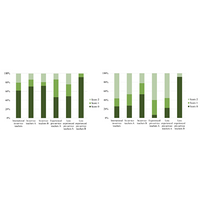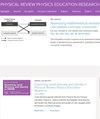如何帮助学生学习:调查在职和职前物理教师如何回应学生的解释
IF 2.6
2区 教育学
Q1 EDUCATION & EDUCATIONAL RESEARCH
Physical Review Physics Education Research
Pub Date : 2024-04-05
DOI:10.1103/physrevphyseducres.20.010120
引用次数: 0
摘要
过去 20 年的研究为我们提供了不可否认的证据,即要学习任何知识,我们都需要成为积极的参与者,而不是被动的观察者。学习物理的一个重要方面就是构建对物理现象的解释。为了支持和引导学生建构自己的解释,教师需要关注和回应学生的解释。为了了解物理教师如何解读和回应学生的解释,我们调查了职前和在职物理教师对学生书面解释复杂物理问题答案的回应。对参与者进行的调查包括问题陈述和四个真实的学生解释。参与者被要求找出每个学生的优点和缺点,并对该学生做出回应。我们发现,虽然参与者成功地找出了学生推理中富有成效和存在问题的方面,但他们在回应学生时却很少以学生的推理为基础,而大多侧重于解决存在问题的方面。本文讨论了为什么这一发现对物理教师准备课程和专业发展课程很重要。本文章由计算机程序翻译,如有差异,请以英文原文为准。

How to help students learn: An investigation of how in- and pre-service physics teachers respond to students’ explanations
Research carried out through the last 20 years gave us undeniable evidence that to learn anything we need to be active participants, not passive observers. One of the important aspects of learning physics is constructing explanations of physical phenomena. To support and guide students toward constructing their explanations, teachers need to be attentive and responsive to students’ explanations. To learn how physics teachers interpret and respond to students’ explanations we investigated pre- and in-service physics teachers’ responses to students’ written explanations of their answers to a complex physics problem. The survey administered to the participants included the problem statement and four authentic student explanations. The participants were asked to identify each student’s strengths and weaknesses and to provide a response to that student. We found that while the participants were successful in identifying productive and problematic aspects of student reasoning, they rarely built on student reasoning when responding to the students, mostly focusing on addressing problematic aspects. The paper discusses why this finding is important for physics teacher preparation programs and professional development programs.
求助全文
通过发布文献求助,成功后即可免费获取论文全文。
去求助
来源期刊

Physical Review Physics Education Research
Social Sciences-Education
CiteScore
5.70
自引率
41.90%
发文量
84
审稿时长
32 weeks
期刊介绍:
PRPER covers all educational levels, from elementary through graduate education. All topics in experimental and theoretical physics education research are accepted, including, but not limited to:
Educational policy
Instructional strategies, and materials development
Research methodology
Epistemology, attitudes, and beliefs
Learning environment
Scientific reasoning and problem solving
Diversity and inclusion
Learning theory
Student participation
Faculty and teacher professional development
 求助内容:
求助内容: 应助结果提醒方式:
应助结果提醒方式:


